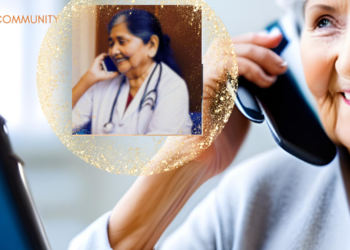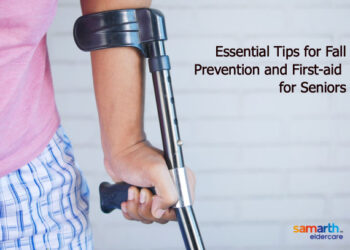An emergency never comes announced and as seniors, we are more prone to accidents and falls than other age groups. With every passing year, we experience reduced visibility and mobility along with weaker and more brittle bones. This means we need to take extra care and precautions as seniors or caregivers of seniors.
Now, while serious accidents and chronic conditions are best left for doctors to handle, a small cut, constipation and the common cold are some minor issues that can be easily taken care of at home with the help of some basic first aid and DIY home remedies.
Here are simple tips to help you attend to small accidents and relieve symptoms of common illnesses.

Join Now >
Scratches and cuts: With age, our skin tends to be thinner and fragile, making it prone to cuts and scratches. In case of a superficial cut, immediately clean it with water and soap. After drying the area, apply an antibiotic cream leave it to dry and heal. Cover with a bandage or gauze if the cut seems deeper.
If the bleeding doesn’t seem to stop or if you have pre-existing conditions that have you on blood thinners, reach out to your nearest health care practitioner for immediate care.
Minor burns: First-degree burns caused by touching a hot utensil or appliance can be easily treated at home. The first and foremost thing to do when treating burns is to run them under cool water. Ensure the area is clean and apply a cold compress to reduce swelling and pain.
To prevent infections, apply antibiotic ointments generously and keep them free from dirt and dust. In case of more severe burns, consult a doctor immediately.
Falls: As we age, our sense of sight and touch tends to deteriorate. We face issues with balance, mobility, our bones become weaker and we are prone to falls and accidents. In case of a fall, help them sit up in a comfortable position and check for bumps, bruises and cuts. Elevate an injured area to ease bleeding and use a cold compress to bring down the swelling.
If you notice serious bleeding or any other signs of discomfort, reach out to your doctor immediately. To prevent further such incidents, ensure that your home is free of hazards that may cause one to trip and fall such as area rugs. Install handrails where necessary, including the bathroom and shower area.
Constipation: As we age, our bowel movement tends to become irregular resulting in constipation. Drinking more water and incorporating more fibre into our diets are two of the easiest way to treat constipation from the comfort of your home. Staying hydrated ensures things get moving again while dietary fibre makes it easier to pass stool.
Probiotic foods such as yoghurt and kefir restore the bacteria balance in the gut, easing constipation. Over-the-counter or natural laxatives such as Isabgol can help the stool to soften, improving gut movement. In case of severe abdominal pain or bleeding, consult your healthcare provider immediately.
Sore throat: While not usually serious, a sore throat can cause your throat to feel itchy or swollen, resulting in throat irritation and discomfort. Most sore throats are a result of a viral/bacterial infection or a sudden weather change.
Soothe the irritation by sipping on a hot mug of tea with ginger, honey and lemon. Gargling warm water mixed with salt can help to alleviate the swelling. Peppermint oil also works wonders when it comes to an itchy throat.
Common cold: Even the best of us come down with the common cold, and as we age, our immune systems are compromised, which makes seniors more susceptible to the flu. When down with a cold, the first and foremost thing to take care of is hydration – ensure you get plenty of fluids as it is known to break up congestion and ease irritation.
If you have a stuffy nose, use steam inhalation for immediate relief. Using a saline nasal spray can also help with blockage. A hearty bowl of steaming soup is also a great way to stay warm and cozy. Ensure you get plenty of rest, sleep and if the symptoms worsen, please consult your doctor immediately.
There is no way you can know when an injury, fall, or illness might occur, which is why it is always a good idea to have a well-stocked first-aid kit at home that is easily accessible by seniors. You can either buy pre-assembled first aid kits from pharmacies or build one from scratch, customized to your needs.
If you’re making a first aid kit on your own, ensure that it contains the following items and more: Scissors, tweezers, cotton, tape, gauze, band-aids, antiseptic ointment, thermometer, cold compress, compression wrap, anti-inflammatory and anti-pyretic medicines, pain relievers, hydrocortisone cream, and something to soothe burns.











